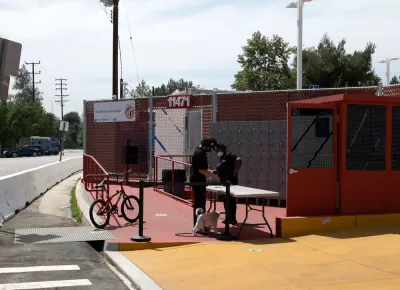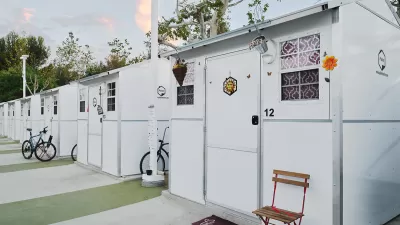Critics of the plan say the effort is a drop in the bucket in a state where tens of thousands of people experience homelessness every night.

“Governor Gavin Newsom announced on Thursday his administration will provide 1,200 tiny homes to cities and counties around California in an effort to shelter unhoused people in the state, which has the highest rate of homelessness in the nation,” according to an article by Chris Nichols and Nicole Nixon for Cap Radio.
The quick-build shelters are viewed as a cost-effective temporary housing solution and have been adopted by some cities as one way to reduce the number of encampments on public property and connect unhoused residents with resources. “The governor said the tiny homes will cost approximately $30 million and would be set up ‘within months, not years,’ estimating they could be open by this fall.” But the authors point out that some ‘tiny home village’ projects in the state have seen delays and cost overruns.
Critics of the plan say it’s only a band-aid for a much larger problem, stemming in part from a lack of clarity about the responsibilities of state and local agencies. “How can local governments address growing homeless camps on state property, such as along freeways, when it’s not their jurisdiction? How can a city provide mental health or addiction treatment services when only county governments are funded to do so?”
To help agencies at different levels coordinate their efforts, “On Thursday morning, the California Association of Counties, CSAC, unveiled its AT HOME plan with the goal of defining those roles for all levels of government.” The plan, which would require state approval to become law, calls on local and state agencies to collaborate on clear definitions of their roles and jurisdictions.
FULL STORY: Newsom administration to provide 1,200 tiny homes statewide, including 350 for the Sacramento region

Alabama: Trump Terminates Settlements for Black Communities Harmed By Raw Sewage
Trump deemed the landmark civil rights agreement “illegal DEI and environmental justice policy.”

Study: Maui’s Plan to Convert Vacation Rentals to Long-Term Housing Could Cause Nearly $1 Billion Economic Loss
The plan would reduce visitor accommodation by 25% resulting in 1,900 jobs lost.

Planetizen Federal Action Tracker
A weekly monitor of how Trump’s orders and actions are impacting planners and planning in America.

Wind Energy on the Rise Despite Federal Policy Reversal
The Trump administration is revoking federal support for renewable energy, but demand for new projects continues unabated.

Passengers Flock to Caltrain After Electrification
The new electric trains are running faster and more reliably, leading to strong ridership growth on the Bay Area rail system.

Texas Churches Rally Behind ‘Yes in God’s Back Yard’ Legislation
Religious leaders want the state to reduce zoning regulations to streamline leasing church-owned land to housing developers.
Urban Design for Planners 1: Software Tools
This six-course series explores essential urban design concepts using open source software and equips planners with the tools they need to participate fully in the urban design process.
Planning for Universal Design
Learn the tools for implementing Universal Design in planning regulations.
Caltrans
Smith Gee Studio
Institute for Housing and Urban Development Studies (IHS)
City of Grandview
Harvard GSD Executive Education
Toledo-Lucas County Plan Commissions
Salt Lake City
NYU Wagner Graduate School of Public Service





























